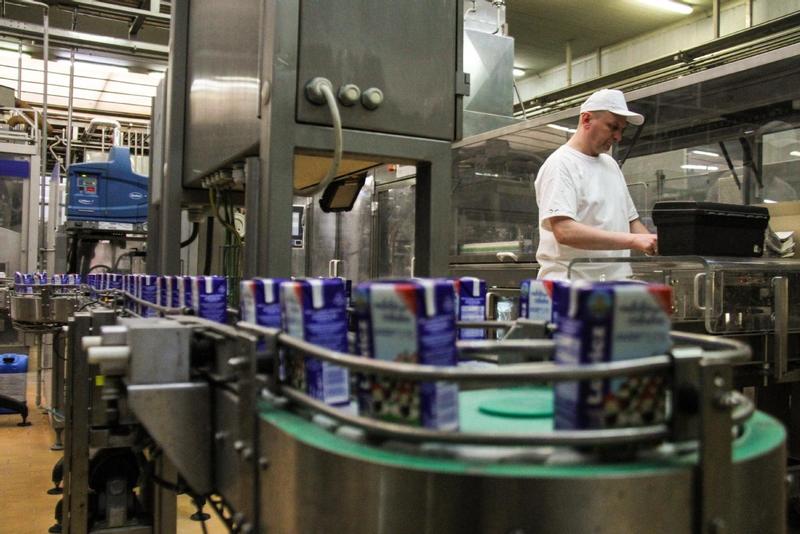 An employee works at a production facility of a dairy company in Lowicz, Poland. (CHEN XU / XINHUA)
An employee works at a production facility of a dairy company in Lowicz, Poland. (CHEN XU / XINHUA)
European agri-food exports to China are expected to be further boosted thanks to the bilateral agreement on geographical indications (GIs), which took effect on Monday-a bid to promote registered agri-food products and protect iconic brand names in both the European Union and China.
An EU delegation visiting China said the agreement initially protects 200 European and Chinese agri-food brands against imitation and usurpation, thus bringing mutual trade benefits and introducing consumers to guaranteed, authentic products from "two regions with rich culinary and cultural traditions".
An additional 350 GI names from both sides will be covered during the next four years.
The EU list of GIs to be protected in China includes products such as Cava, Champagne, Feta, Irish Whiskey, Munchener Bier, Ouzo, Polska Wodka, Porto, Prosciutto di Parma and Queso Manchego.
Among Chinese GIs, the list includes Pixian Dou Ban (Pixian Bean Paste), Anji Bai Cha (Anji White Tea), Panjin Da Mi (Panjin rice) and Anqiu Da Jiang (Anqiu Ginger).
"China and the EU will now work together with many cooperation and promotion projects to ensure good implementation and enforcement of the agreement on each other's market and promotion of their iconic GI names," said the diplomatic delegation.
Being the third-biggest destination for EU agri-food products in 2020, the Chinese market "has high-growth potential for European food and drinks," said the EU mission.
China is already the second-biggest destination of EU exports of GI products, accounting for 9 percent by value. "The Chinese consumers appreciate the safety, quality and authenticity of European agri-food," said the mission.
The deal is expected to bring more authentic European agri-food products with competitive prices for consumers in China, further strengthening bilateral trade and economic cooperation, and helping consumers and enterprises from both sides, said industry insiders.
ALSO READ: Brexit deal starts to hit food supply chain in EU
The list will definitely play a big role in bringing our products and brands closer to Chinese consumers and to winning their preference.
Andrzej Juchniewicz, chief representative of the Polish Investment and Trade Agency's China office
Andrzej Juchniewicz, chief representative of the Polish Investment and Trade Agency's China office, hailed the implementation of the agreement.
Among the first batch of registered products on the list, there is a product from Poland-a Polish vodka. The representative said his country is expected to add more names to the forthcoming batches on the list. "The list will definitely play a big role in bringing our products and brands closer to Chinese consumers and to winning their preference," said Juchniewicz. "We are now making efforts to add more alcoholic beverages and agricultural food products, particularly our dairy products on the list from our country."
Dairy exports from Poland to China have been on a sharp rise since last year due to the rising health awareness among Chinese consumers. The volume of dairy products from Poland to China, including milk, milk powder and cheese, grew by 70 percent in 2020, compared with that of the prior year.
"Interest among local consumers in Polish dairy products has been significantly enhanced," Juchniewicz said.
In October, the China-Europe Railway Express carrying the first batch of Polish dairy products arrived in Wuhan, capital of Hubei province, with about 50 containers of 1,100 metric tons of milk and milk powder products. In the future, the Polish "Dairy Express" will run regularly, two or three times a month, expanding its exported products to apple juice and cereals, he added.
According to Metro China, a leading membership-driven retailer, after the third China International Import Expo held in Shanghai, the company has brought more than 150 imported European products, including branded agri-foods such as Iberia Ham from Spain. Its European imported products available at its stores in China include wines, juices, dairy, meat, fruit and frozen desserts.
According to JDDJ, the on-demand retail platform of Dada Group-it is a leading platform for local on-demand retail and delivery in China-during this year's Spring Festival holiday, revenues from imported products on the platform have grown 70 percent year-on-year. Among them, the amount of yogurt from Greece sold through the platform was 6.5 times that of the previous year. Sales of Polish milk brand Mlekovita and Pilsner Urquell from the Czech Republic, have also surged.
Chinese consumers have been found to increasingly favor quality brands, said JDDJ.
Sales of brandy and rum on JDDJ during the Spring Festival holiday are 13.6 times and 8.8 times that of the same period of last year, respectively. Western foods in five big cities, including Chengdu, Shanghai and Beijing, have seen strong growth.
READ MORE: For China and EU, way to common prosperity could be through food
Xinhua contributed to this story.
Contact the writers at wangzhuoqiong@chinadaily.com.cn


